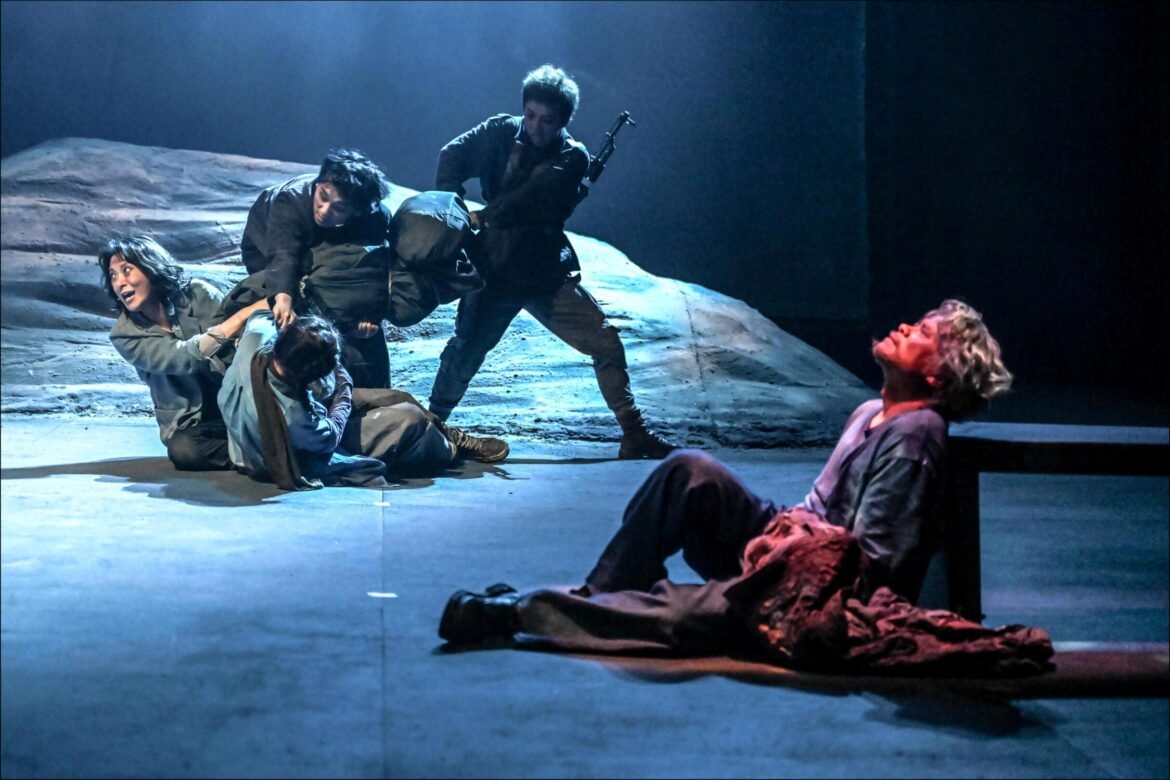Sejong Center for the Performing Arts (artistic director, Sun-Woong Koh) staged the play Littoral by Lebanese-Canadian playwright Wajdi Mouawad from June 14 to June 30. This was a Seoul Theatre production, with direction by Jeong Kim and translation by Jaeil Lim. This play, also translated as “Tideline,” was written in 1999 and is the first of Mouawad’s epic quartet called The Blood of Promises (Le Sang des promesses), alongside Scorched (Incendies, 2003), Forests (Forêts, 2006), and Heavens (Ciels, 2009). The play is based on the author’s own history of having to leave his home country of Lebanon with his family during the Lebanese Civil War (1975 ~ 1990), which caused the exodus of approximately one million people.
Wilfrid (Seungwoo Lee) gets a call about his estranged father Ismael’s passing and embarks on a journey in search of a burial place for him. After losing his wife, Ismael (Sanghwa Yoon) lived as a recluse, and his wife’s family do not accept his burial next to her. Wilfrid then brings his father to his father’s home country in Lebanon. But the civil war barely left any spot for another corpse. Continuing his journey, Wilfrid encounters others who are just as lost and devastated by the war. Together, they keep searching for the right burial spot.


Littoral, by Wajdi Mouawad, directed by Jeong Kim, at Sejong Center for the Performing Arts. Photo: Sejong Center for the Performing Arts
While the play’s subject matter is sad and solemn, the production presents a feast of dynamic theatricality. This incongruity, marked by rapid dialogue, rhythmic music, and swift transitions between reality and fantasy/dream, may at times be dizzying but gradually immerses the spectator in the narrative and the mise-en-scène. There is always something to pay attention to, whether it is visual, musical, physical, or oral.
Another captivating element of this production is its expansive spatial dimension. The set, designed by Taesup Lee, is mostly bare and stays mainly unchanged. Yet the spareness adds more significance to the represented elements. The small hill upstage, for example, is utilized to mark the physical exhaustion the characters go through as well as the symbolic trial and error. In addition, the lighting, by Dongsun Shin, transforms the stage seamlessly, from a funeral home to the middle of the forest, the beach, and underneath the ocean as well as the abstract and fantastical realms.


Littoral, by Wajdi Mouawad, directed by Jeong Kim, at Sejong Center for the Performing Arts. Photo: Sejong Center for the Performing Arts
The father Ismael appears as both dead and as a young man (Chulho Yoon), and both of them communicate with Wilfrid through the journey. The people Wilfrid befriends along the way are all outcasts with their own trauma, and they form a familial bond, which none of them has experienced before. Each character’s experience makes them a protagonist in their own story and history.


Littoral, by Wajdi Mouawad, directed by Jeong Kim, at Sejong Center for the Performing Arts. Photo: Sejong Center for the Performing Arts
Littoral as a whole offers a compelling narrative and rich theatrical experience through the tight and emotionally gripping story, intellectually stimulating questions, and the skillful exploration of the ambivalent relationships between life and death, between reality and dream/fantasy, and between existence and identity. For a Korean audience, who may have their own knowledge, memory, or experience of a devastating war, this piece’s resonance would be felt even more strongly in terms of the experience of loss and the continuous search for a place to rest in peace. The personal narrative told in the large context of war would, I believe, have just as strong of an appeal and relevance in any nation that has gone through a war and is still suffering from it.


Littoral, by Wajdi Mouawad, directed by Jeong Kim, at Sejong Center for the Performing Arts. Photo: Sejong Center for the Performing Arts
This post was written by the author in their personal capacity.The opinions expressed in this article are the author’s own and do not reflect the view of The Theatre Times, their staff or collaborators.
This post was written by Walter Byongsok Chon.
The views expressed here belong to the author and do not necessarily reflect our views and opinions.

